
by wp-admin | Dec 9, 2021 | Exploring the Mental Fitness Formula
In this picture Dixie is unhappy because of her bow, but okay because she’s gotten lots of treats for her trouble! A well-cared-for pet is playful, trusting and open to love. So also our own inner Child can enjoy these feelings when our Parent and Adult work well together. As I mentioned, the Parent holds the rules and beliefs you’ve learned as you’ve gone through your life. These can be conflicting and confusing for your Child. Let’s look at the first Toxic Belief, that you must have the approval of certain or many others to feel comfortable with yourself. This belief can be especially burdensome during the holidays, when you may come together with family or friends. We all have memories and expectations, good and bad, from our own experiences of holidays past.
Your Adult can make things easier for you, if it takes time to study your own memories and expectations. Once identified, they can be re-evaluated. If you find your Child dreading some parts of the holidays, your Adult can ask, why am I doing this every year? Then your Parent will provide the answer: because you owe it to your parents, and you must have their approval to enjoy the holidays; because your kids expect it; because the neighbors will talk; because you don’t want to make everyone angry or disappointed. With the first Toxic Belief, you feel like you’re a bad person (or bad Child) if you don’t have their approval.
“Well,” your Adult reasons, “there’s some merit in these concerns. I don’t want to be selfish and hurt my parents or kids by letting them down. My Child will feel guilty forever if I don’t come through.” This dilemma illustrates the input of two consistently different Parent parts. Your Indulgent Parent encourages you to put yourself first and ignore others’ input and needs, which gives you temporary relief. About half the toxic beliefs come from that Parent. The other six beliefs come from your Critical Parent, who tells you to distrust yourself and follow other people’s rules. This leads you to feel anxious about others’ judgment and approval. Their input can keep you on an emotional seesaw where your Child just can’t win.
When your Adult identifies a Toxic Belief, it has the opportunity to push for a more balanced view. In this case of holiday turmoil, it can suggest that you might discuss your needs and feelings with the other people to see if a different plan might also work for them. Everyone wins if they say, “Oh, thank goodness, I didn’t want to keep making a six-course dinner for thirty again this year either!” Identifying the belief allows your Adult to keep you from assuming what others want, a good reality check.
A bigger test happens when others are unwilling to consider your needs and feelings. Then your Adult must work with your Parent parts to make a plan that you believe is fair to both you and the others. They may still disapprove, but you won’t suffer so much. Your Adult can revise the first Toxic Belief like this: “I don’t need the approval of others; I need to balance their needs and mine to find the best solutions. Only I can finally make these evaluations for me, as an expression of my beliefs.” My teenage Child (who still wants others’ approval) will often add, “Perhaps their Indulgent or Critical Parents need some adjustment!” This process gradually builds for you a Wise Parent which replaces many of your Critical and Indulgent Parent messages. The Wise Parent holds your revised beliefs, which keep your Child more comfortable and happy.
Here’s a poem I wrote several years ago about my new plan for Christmas. It illustrates the input of my newly wiser Parent and the friskiness of my Adolescent/Child as a result. Most family and friends were fine with this, and the others just got over it. I did make a few exceptions for some who needed these to feel loved. Wisdom involves compromise.
Fake Fir
Always the scent of pine pitch
In the chill night air, crushed out
Of the carpet of needles lavishly strewn
Over the corner tree lot.
Always the hunt for the quintessential
Tree-of-the year, just so tall,
Just so irregular, just so fluffy.
Often in the rain, always in the dark.
Rebellion crept in slowly over the years,
First, with fewer gifts mailed out,
Then no more German Honey Bars,
And last, the ultimate sacrilege.
There it was on sale at McLendon’s:
Frankly artificial and just the right size.
Up a week earlier and not so prickly,
With hardly a needle to sweep.
No trunk to cut or water to spill
Or worry about how dry it was,
Lights and angels, toys and bells
Sparkled serenely unaware.
Now Christmas is more of spirit,
Of ancient carols heard with thoughtful ear,
Of Amahl and the Night Visitors,
And homemade frosted butter cookies.
No rush to finish before the tree dies.
Time to write and talk to friends,
To savor the season of celebration
And rejoice in the new birth of Love.
Who knows what contumacy is next?
Wrapping paper thrice recycled?
Ready-made pie crust and frozen hors d’oeuvres?
A cuddly, cream-colored fake fur?
12/04 Rea Anne Scovill

by wp-admin | Dec 9, 2021 | Exploring the Mental Fitness Formula
I love to listen to Windham Hill instrumental music, lie on my couch, gazing at the Douglas firs outside and just let my thoughts roam at this time of year. I’m contemplating this picture of a little pool around a rock on the ocean beach. I wrote another post for this week, but it’s too cluttered and complicated. A tide pool-like post is what I need.
Let’s look again at the crafting of one of my pebble mosaics to illustrate how your Adult can work with the outer world this time. Before I craft a pebble mosaic, I collect stones during many beach and river walks, often over several years. Sometimes I just focus on getting flat, roundish black ones. Other times I challenge myself to find some red or greenish ones, which are more rare. Experience has shown me about how big they all have to be, and that smooth, well-worn rocks come together in patterns I like. My Child joins in with her sensitivity to color, shape and beauty.
It’s your Adult who must look outward and select what you need for creating each thing you undertake. If it takes on too many projects, you’ll get confused and overwhelmed. If it narrows the selection too much, you’ll miss out on some possibilities. For one mosaic I just allowed flat round blue-black pebbles in concentric circles. I love the result. It seems to invite looking inward. But other shapes and colors greatly expand what designs I can create.
In January, people make resolutions to accomplish things they may not have gotten to the previous year: getting more exercise, straightening out their finances, organizing their closets, cooking more healthy food. How much input do their Adults have in this process? The whole resolution idea can set-up disharmony between Critical and Indulgent Parents and distressed fight-or-flight reactions in your Child.
The number of possible areas to focus is so overwhelming that most resolutions drift into the jumble of daily life. Your Parent and Child parts can become too confused to allow your Adult to function very well. You may not get enough rest to keep your brain healthy. You might try to multi-task to keep up, not really enjoying or taking full satisfaction in anything you do. You may compare yourself to others who seem to have their lives in better order and get discouraged.
Yet it’s possible that you actually managed to accomplish a lot in the past year. If all I do some years is pick up a bunch of pebbles on a few walks, I store them in special boxes for when there is time to craft again. Store your small and large accomplishments in your Wise Parent’s special memory chest to keep yourself hopeful and confident. This will help you handle more kinds of input and craft what you find into pleasing and positive designs for your life.
Gazing at a small round pool or circle of stones can be pleasant and comforting for awhile. You’ll need a strong, creative Adult to explore all the streams and colors of your true potential. My Adult has to keep us collecting pebbles longer than any Child could enjoy for me to accomplish an entire mosaic. Once I’m laying out the mosaic, it has to keep refocusing my effort over several hours-long sessions to carry out a pleasing pattern. Finally my Adult will make sure there’s time to clean up my mess as my Critical Parent watches nearby, and then figure out how to hang it up.
Your Adult can learn how to keep open to new possibilities while it also manages your daily life. It can learn through practice how to reduce inner conflict by managing your Parent and Child parts with more skill. Then it will be free to select and sort your experiences to plan for your next projects. What pebbles will you need for each mosaic of your life? How do you decide what designs to use, what directions to take? When can you find the time to craft them? Where do you find the confidence to keep working at all this?
As you revise your toxic beliefs and explore your potential, encountering other’s ideas for how to live, your Wise Parent will become strong. Balancing out your inner-world will become more “natural” and less demanding of your Adult’s attention. You’ll have less time spent in fight-or-flight and more energy to follow a unique path of your own. You’ll find that end-of-year reflections lead more easily to exciting plans for the next year.
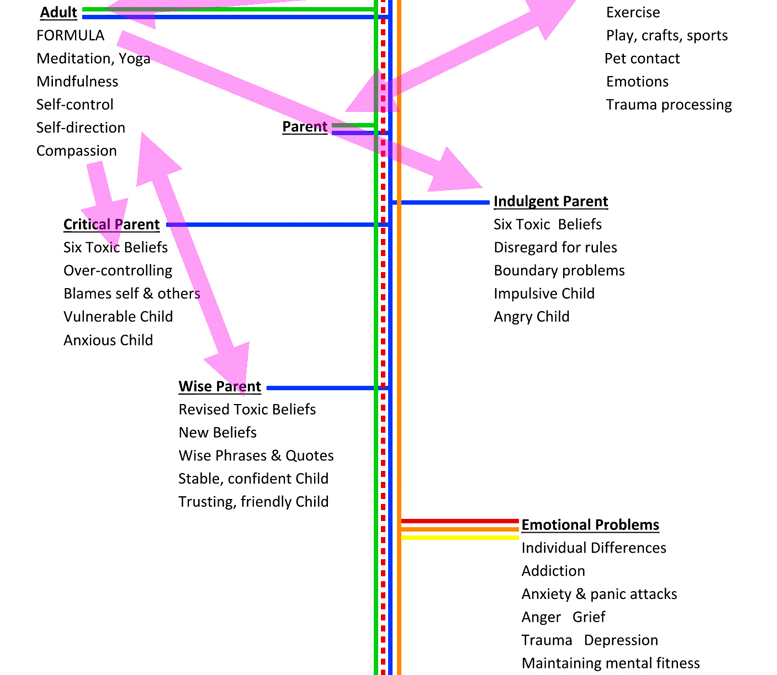
by wp-admin | Dec 9, 2021 | Exploring the Mental Fitness Formula
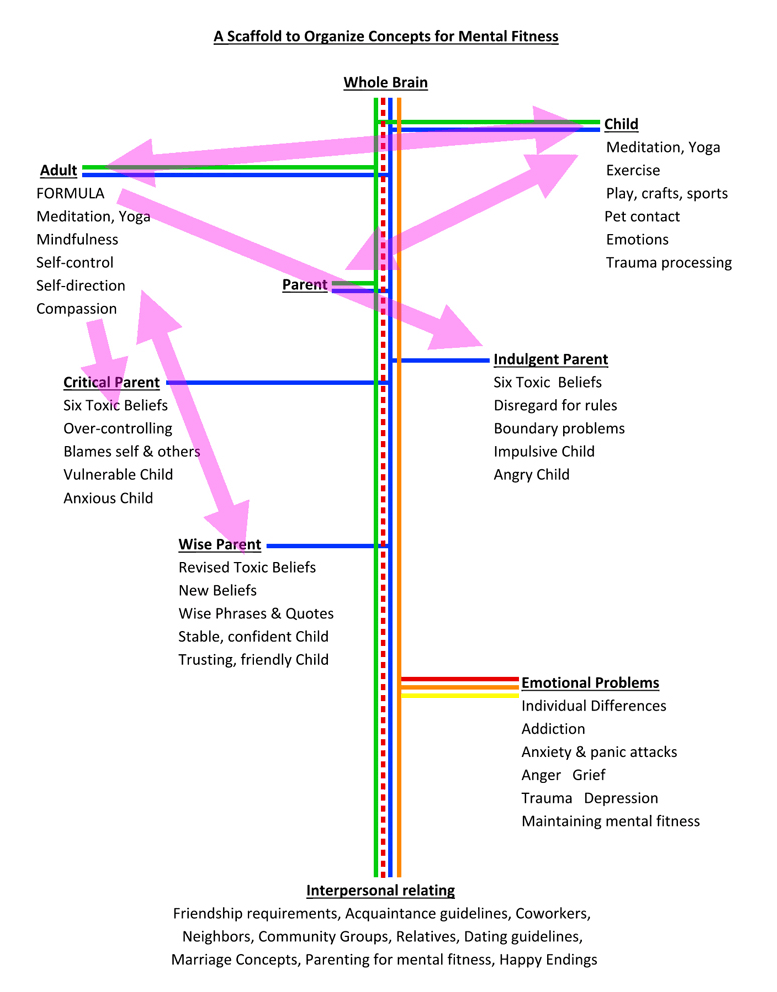
One day I decided that I should sort out for myself and my readers just how the FORMULA and the Adult-Parent-Child systems inter-connect and relate to Mental Fitness issues. I created the “Scaffold” here to capture this for us. In previous posts I’ve illustrated how these systems can combine by describing how I used them to combat fight-or-flight reactions in a few situations. Following the list of 12 Toxic Beliefs in the website discussion of the FORMULA, I noted that usually the first half of the beliefs belong to the Critical Parent and the next, to the Indulgent Parent. Then in Post #2 I admitted that I often think of myself as “we” instead of “I.”
In the scaffold drawing you can see arrows between the Adult-Parent-Child parts denoting how they influence each other. For you who like to have things sorted this way, I hope the scaffold helps. The entire scaffold will be more relevant in future posts. For now it might give you an overview for reference. For those who prefer a more intuitive approach, let me describe how I came to see my mind as multiple parts and why I find it helpful to divide it this way.
After my divorce in the 1970s I had to fend off waves of anxiety and dread that threatened to overwhelm me. I discovered that if my Adult could separate itself from my warring and confused Child and Parent parts, I could get my feet back on the ground. My own take on Eric Berne’s avatars (see ….) allowed me to function as a parent and graduate student despite frequent severe insomnia and panic attacks.
The fact that I could recognize and correct my toxic beliefs on my own was very reassuring and stabilizing. When negative feelings threatened to take over, I decided to use the reminder phrase, “Divide and conquer” to shove them aside. This gave my Adult the space to start sorting them out. My experiences as a mother, babysitter and teacher gave me a short-cut for how to comfort and reassure my own inner frightened or angry Child.
To sort out my Parent parts, I related each parent to half the beliefs and created reminder phrases for my Adult to use when they were too disruptive. “Stop exaggerating; none of this will kill us!” for my Critical Parent and “You’re just setting us up for future grief and we (Adult & Child) know it!” for my Indulgent Parent. These phrases respond to the basic message expressed through each Parent’s beliefs. They provided the space for my Adult to step in and revise any specific Child Brain Habits or Toxic Beliefs involved. “Divide and conquer!” worked so well that I’ve used it ever since.
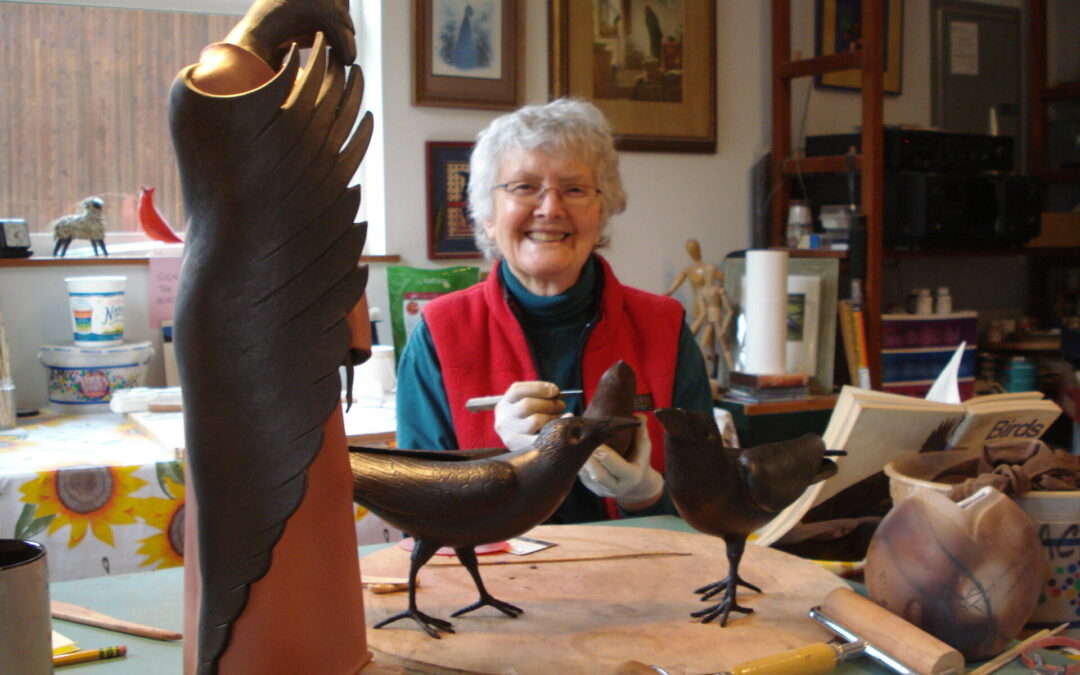
by wp-admin | Dec 9, 2021 | Exploring the Mental Fitness Formula
It seems to be easy for people to recognize their Critical Parent. When it presses it’s Toxic Beliefs on you, you feel it right away with a tightening gut or fists, flushed face, mental sense of being overwhelmed, prickling on the back of your neck or other body fight-or-flight reactions. Here’s an example of how your Adult and Wise Parent can limit its impact and keep you calm.
Ann Kelly, pictured above in her cozy pottery studio, demonstrates as a teacher the effects of not subscribing to Belief #3. This belief holds that when people, including yourself, don’t meet some standard you’ve set, they must be blamed and/or punished. In her studio, after I accidentally stained her new gray carpet with fine red clay, she had every right to chastise me. Instead, she provided a towel to put below my table and assured me that the stain might come out with a thorough cleaning. I felt awful, but without the clutch in my gut I would have had in my younger years, partly due to her kindness, and partly due to my work to reduce the power of belief #3.
What happens in your particular body when you’ve made a mistake that hurts someone else? That’s your Adult’s signal to step in and assure your Child that your life is not at stake. Remember, your body can’t help with complex problems. It’s only designed to save your life, not your friendships or your reputation. Ann helped reassure me with her kind response, but you can’t count on others to help you. Your Adult must quickly jump in to keep your Child from fight-or-flight .
How did I teach my stomach to butt out? First, I’d clutch in some situations and afterwards review what went on with my Parent and Child for that to happen. I’d see that belief #3 in some form was in play. My Critical Parent would scold my Child, saying, “How dare you be so careless when such a generous and kind woman is helping you?” And then my Child would tell itself, “I can’t stand it that I’m such a screw-up!” That would trigger my fight-or-flight response, the stomach clutch. You may be thinking, that’s not really fleeing or fighting. Herbert Benson, who studied this for much of his life, noted that when we don’t go actively into fight-or-flight, our body just stews in a toxic funk with our reaction. Benson says our bodies would be healthier if we did run away or strike out.
So instead of stewing with my guts in a knot after I stained Ann’s carpet, I felt a milder upset in my body and my Adult wasn’t overwhelmed by toxic fight-or-flight chemistry. After many years of work to manage the impact of belief #3, my Adult had built me a Wise Parent, who quickly offered reassuring comments for my Child. They went like this: “You know you always have trouble with this kind of situation and it doesn’t help to get all upset. You forgive others who harm you and you must forgive yourself too. You’re just human and you can’t help making mistakes.”
If Ann had joined my Critical Parent to scold my Child, my Wise Parent have added this: “You know how much you always want others’ approval (Belief #1), but you can’t always have it, especially if you create problems for them. They may still subscribe to Belief #3, but you don’t have to join them. Stay calm so our Adult can focus on solving the problem.” I’m happy to report that it’s taken a long time, but this Wise Parent self-talk is now more powerful than my Critical Parent’s and my gut doesn’t clutch so badly unless a car is coming at me down the road.
After a mistake one day a few years ago, my Wise Parent coined a reminder phrase to summarize my revision of Belief #3 and help my Adult jump in quickly: “I never deserve to feel that bad.” I had to evaluate whether I could really believe this: “Would I ever want another well-meaning person to feel that bad? No. Do I try to consider the other person most of the time? Yes. Do I demand that others be perfectly considerate of me? No. So I can give myself a break.” And just for the record, I did manage to get the stain out of Ann’s carpetJ
Part I, chapters 3 and 4 of Claim Your Own Mental Fitness describe this process in more detail and for all Twelve Toxic Beliefs. How this applies for other fight-or flight responses, like anxiety, cravings, anger, grief or depression is described in Part II. How to apply this in other situations with people like friends, co-workers, relatives, marriage partners or kids is covered in Part III. When you’ve mastered this process for both your inner-world fight-or-flight reactions and with your social contacts, you will enjoy true mental fitness and the inner peace it brings.
*Herbert Benson with Miriam Z. Klipper, The Relaxation Response, 1992.
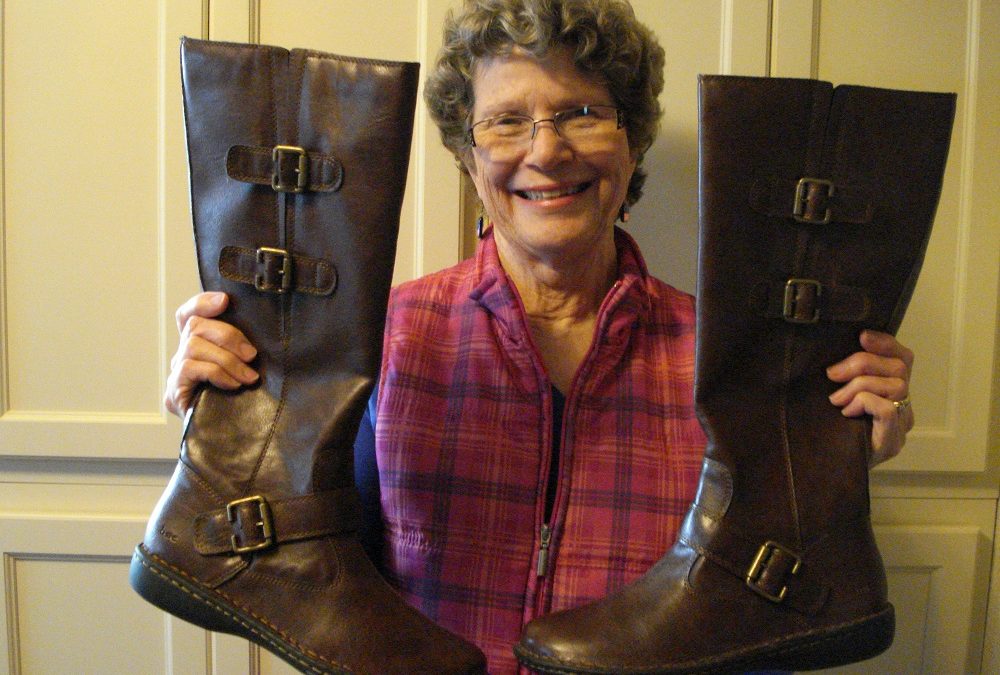
by wp-admin | Dec 9, 2021 | Exploring the Mental Fitness Formula
A penny saved is a penny earned.
Now that you can feel your Critical Parent (CP) at work, it’s more of a challenge to identify when your Indulgent Parent (IP) is stepping in. If your Adult fails to do this, you’ll certainly suffer the consequences. First it’s helpful to realize how often your Child takes control. Your Indulgent Parent facilitates your Child’s wired-in pleasure-seeking and pain-avoiding impulses. Marketing forces have focused billions of dollars and their shrewdest minds on how to target your Child without your Adult noticing. Sometimes you recognize their more blatant efforts to spin your Child into a strong and demanding force. The brain chemistry of this excitement can overwhelm your Adult, allowing you to buy the car you can’t afford or gamble away your savings. But with these big temptations, your Adult may be able to see the lies within the marketing and steer your Child into safer pleasures.
It’s when the ploy is more subtle that you can get taken in. When you see that something’s priced at $199.99, do you fully realize that it’s closer to $200 than $100? I get tricked by this even though I know the truth. My Child doesn’t want to face reality, so it overrides my Adult and gets the yummy new boots. My Indulgent Parent gives it permission to avoid facing this with Belief #9, that it’s more comfortable to avoid than to face responsibilities.. It also assures my Child that she’s special and deserves these great boots with Belief #11. Finally, my Indulgent Parent pushes Belief #10, that happiness depends on what life gives you. When my Child puts these boots on, it’s thrilled and feels just fine. When the credit card statement comes, my Critical Parent may berate it, calling it irresponsible and foolish. This would put a cloud over the pleasure of these tempting boots.
Your Indulgent Parent sets your child free to do whatever it wants right now. It overrides your Adult efforts to plan for a good future. It sabotages your budget, deludes you about how long things will take and lets you fail to keep your promises. Your Child is a force without its own judgment about the impact on your future or on others in your life. For you to have good relationships or develop what you plan, your Adult must have the support of your Wise Parent. Your Wise Parent can offer the revised beliefs that come from balancing your Critical and Indulgent Parent influences.
My Wise Parent, pulled in by my watchful Adult, could remind my Child that it also wants to get some plants for my garden, or take a trip to our favorite coastal town with the delightful basalt rocks along the ocean. It could note that $199.99 is just one cent away from $200.00 and the greedy advertising people are just trying to trick us. It could make clear that happiness comes from making wise choices about how to use your money, not really from the things money can buy. Your Wise Parent can remind your Child that it feels good to know you made a plan and followed it through to enjoy your life, and not feel foolish because you got distracted and cheated yourself out of guilt-free fun.
Your Child feels secure and has self-esteem when your Adult and Wise Parent take charge. It suffers when your Adult is careless and lets your Indulgent Parent seduce your Child with its permissive Toxic Beliefs.
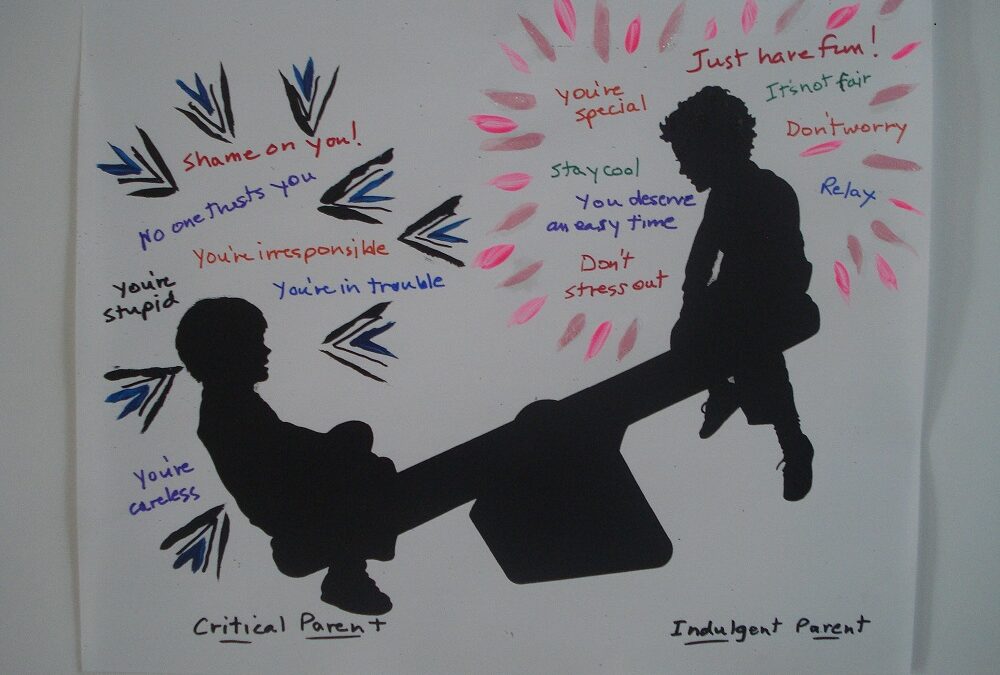
by wp-admin | Dec 9, 2021 | Exploring the Mental Fitness Formula
A see-saw of self-indulgence and self-punishment happens when you’re set up by your Indulgent Parent (IP). Your Critical Parent (CP) keeps you on a short leash so you can’t get into trouble, scolding your Child each time you fail to measure up to one of the six toxic beliefs your CP holds. Your Indulgent Parent soothes your child into a false sense of security as it supports the next six toxic beliefs.
Let’s take the example procrastination, Toxic Belief # 9, that it’s more comfortable to avoid than to face problems or responsibilities. This belief caters to your Child’s focus on present satisfaction rather than future security. Your Adult may caution, “Do I want the ice cream cone now, or the next-size-smaller pants in a month?” Then your Indulgent Parent whispers, “Oh, it won’t hurt to enjoy just this little treat. You deserve it. Why do today what you can put off until tomorrow?” Or you have a project for school or work that seems so difficult that you can feel your Child’s resistance in your gut. Your IP croons, “You don’t have to start that today; why not wait until you feel more up to it tomorrow?” It might add “It’s just not fair that they expect so much from you,” to encourage Belief # 11, that you’re special so you deserve an easier path.
A month later you’re still in the same size pants, your boss gives you a corrective action and your school project gets a failing grade. Your IP may still tell you it’s not fair or you don’t deserve such treatment, but your Critical Parent torments you for being lazy, irresponsible and lacking in character. Set up by your Indulgent Parent, you’ve traded future well-being for present comfort and your self-esteem has taken a hit. When this see-saw continues, it leads to decreased self-confidence, energy, hope and possible even to depression. Addiction is a frequent companion to this process, where your IP encourages using the drug-of-choice to gain temporary relief from the stress created by your failure to face problems or responsibilities. This process is described in detail in Part II, Chapter 2 of Claim Your Own Mental Fitness.
Your Adult must act with a firm hand to grab the see-saw and tell you to get off. It can identify Belief #9 along with any others involved. For example, your avoidance might have begun after you had a disappointing experience that prompted toxic belief #7, that it’s unbearable to work hard for something and not get it. Your IP may chime in to say, “you tried hard enough to (lose weight, get a promotion, get an A), so why keep trying?” Your Child’s Black and White thinking could prevent you from looking for new ways to cope: it’s fair or unfair, it’s easy or it’s too hard, you’re special or worthless.
Once you’re off the see-saw, and seated with a cool glass of water under a friendly tree, your Wise Parent (WP) could remind you that: 1. Black-and-white thinking traps you into quitting or avoiding, not creative problem solving. It’s better to consider how to cope in a different way. 2. When you put off doing something you have to do, you create low-level anxiety, not peace. You may also end up with additional problems that are even harder to manage. 3 It’s not unbearable if your aren’t rewarded each time you work hard for something; everyone has to learn how to deal with this sometime.
Your Adult can help you break up a task into bite-sized pieces Your Wise Parent can offer encouraging words like, “a journey of a thousand miles begins with a single step” or “remember when you did this well before and how you got there.”

by wp-admin | Dec 9, 2021 | Exploring the Mental Fitness Formula
In psychology we define generalization as “the brain’s tendency to respond in the same way to different but similar things or situations.” For example, when you were in fifth grade your math teacher taught you a formula or principle using a few example problems. Then she’d give you a test with some different problems to see if you could still recognize and apply it. If you could, she’d know you’d learned it. You count on generalizing to apply what you learn to similar situations in the future and cope with them.
We must generalize continually to learn anything. We can’t learn enough by looking at examples of things, we need to pool our experiences and create expectations that allow us to plan our lives. Which restaurant tonight, with whom? Who can I count on to help with this new project? I don’t have a tool to fix this, what could I substitute that will work almost as well? We need to identify what’s similar between different things to make choices.
Overgeneralizing creeps in when the new situation is not as similar as you think. You might have applied a formula to a problem where it didn’t work and gotten it wrong in fifth grade. In real life you’re presented with countless opportunities to apply previous learning in situations where it doesn’t fit. Stereotyping is an example of overgeneralizing with people. It’s a short-cut for evaluating another person which may have had survival value in ancient times. Humans (and other animals) naturally do it because they want or need a quick idea of how to relate to someone new.
However, it takes time to see other people accurately in all their unique complexity. We may see traits in someone new that remind us of others we’ve known or heard about and think they’ll be alike. You can’t take time to know that many people very well. If your Adult doesn’t recognize when you’re relying on assumptions that you haven’t checked out yet, you may fail to see how your new acquaintance is different from what you thought.
If you then treat him unfairly, and don’t recognize signs that your assumptions don’t fit, your overgeneralization can set off some toxic beliefs. You can expect things that are positive or negative about him that aren’t true. Either way, you’ll create problems when you try to relate, as long as your Adult doesn’t wake up and see that you’ve overgeneralized into a false view of him.
When you realize you don’t have enough information to judge someone, you’re less likely to get drawn into fight-or-flight interactions with them. Your Adult can keep monitoring for when a toxic belief is emerging and refrain from being hurt by or blaming this new person. For example, Belief #3, where you blame someone for making what you consider a mistake, is one belief that becomes more intense when you overgeneralize. Your Adult may not consider how his differences could cause his unexpected behavior and your Critical Parent comes down on him. A strong Adult will guard against this by recognizing your human tendency to assume similarities between people without checking out your assumptions before you spring into fight-or-flight.
Overgeneralizing may be the most common source of misinformation that leads you to operate in a “false world.” This brain habit causes an inevitable struggle for your Adult to manage all your life. It spawns serious social justice problems when people hear and believe negative things about groups who differ from their own. Keeping an open mind about people who differ from us seems to be very hard. We often overgeneralize by equating different with threatening and press newcomers to conform to our ways. In our distant past this tendency may have been protective for our survival, but you’ll need to update it indefinitely.
You’re probably aware of stereotypes for groups with different skin color, religion, personal style, interests, occupation, sexual identification, accent, etc. Others will urge you to join them as they discriminate against others who are different. They count on scaring or tempting your Child and sucking in your Parents (and their toxic beliefs) to override your Adult functioning. Once your Adult learns how to recognize their pressures to overgeneralize, it can begin its detective work. It must identify the toxic beliefs of your Parents, reassure your Child and finally develop Wise Parent messages to help keep you on track. I don’t really know yet is a good phrase to keep handy.

by wp-admin | Dec 9, 2021 | Exploring the Mental Fitness Formula

Feliciana Netamba cares for her two children at their home in the Cacilhas village near Huambo, Angola, where the MENTOR Initiative is working to help control malaria. Photo by Mike DuBose, United Methodist News Service.
When your Parent and Child parts buy into what should be tentative conclusions, or guesses, they move away from the truth about a situation. Overgeneralizing words like always, never, all, everyone or no one, only and assume should signal your Adult into quick action. Here’s how overgeneralizing ignites fight-or-flight for a few beliefs: Belief #7 is in effect when you tell yourself that if you work long and hard, it will always lead to the success you wanted. Belief # 5 discourages you from trying when you think you can never overcome the disadvantages of your past. Beliefs # 2 and 3 can trigger intense jealousy if someone else outperforms you in an area where you assume you’ll always come out ahead. Belief # 8 may encourage you to quit looking for your best path because you think that happiness is only and always just what life gives you.
To reduce fight-or flight reactions to always and never overgeneralizing in your toxic beliefs, your Adult must offer Wise Parent phrases like: I’m just guessing about this, but this is what I think now; or from what I know about it, this may work. It’s often best to say, until I get more information, I can’t evaluate this. Your Wise Parent is developed as you revise toxic beliefs and gain wisdom from others. It acts like a bank from which your Adult can withdraw phrases to revise persistent toxic beliefs and quiet fight-or-flight responding.
The best example of humans coming together to manage overgeneralization may be found in the scientific method. It’s designed to prevent people from concluding that things are true based on just a few examples. Testimonials from individuals make the news, but they can’t offer reliable information about most people. Scientists publish articles where they detail how they followed the scientific method in their work. These allow anyone to judge whether their conclusions are close to being true. Here are some steps that the scientific method offers to help you avoid living in a false world:
- When a study is reported it must disclose who funded it. This allows the reader to consider how it might have been biased in favor of the funding group or groups.
- Scientists must define how they’ve selected the participants. Random sampling is the goal for initial selection and important at every step. If this isn’t done, the results can’t be generalized to groups containing a different type of person (gender, age, experience, level of health, ethnic or racial group, etc.) For years all research on breast cancer was done with men, because women’s hormone changes made study more difficult in them. Scientists who conducted these were overgeneralizing if they that the results of a treatment would work the same for women generally as for the men in their studies. Often this did occur.
- There must be a large enough group of people studied for any answers to be considered even partially true. Scientists describe the probability that their findings are true in percentages.
- When large, well-run studies by several respected groups around the world come up with the same results, you can have the most confidence that their findings can be generalized to people in general. After just one study, it’s common for other researchers to run similar studies and find different results. Even one factor that’s different, like reliance on participants from England instead of Kenya, can change the outcome. They’d be overgeneralizing if they claimed that their results would be true beyond England for some issues.
How do scientists guard against overgeneralizing? They document how they perform every step of their studies and encourage others to try to duplicate their work. Because it’s impossible to provide conditions like perfect random sampling, honest researchers will share the limits of how their work can be generalized. Those who do overgeneralize lose the respect and trust of other scientists and their funding. They hurt the progress of science because large research studies are expensive and require the committed efforts of many people, often over many years. In medicine and other areas of research this can be devastating.
Researchers who won’t follow the rules and lie about it may subscribe to Indulgent Parent Belief # 12: If you’re very clever, you can find shortcuts around the frustrating rules in our society. They don’t get away with it because other studies will prove their claims to be false. In medicine they waste precious time when new treatments are badly needed. If their work is overgeneralized, they may harm many people. An example of this is when doctors choose to overgeneralize by prescribing medicine that hasn’t been proven effective or safe for people outside the group that’s been studied.
How can your Adult sift through all the information you receive to identify what’s most likely to be true? Watch for how a scientist or doctor describes it. Do they use the words always or never? Do they refer to reliable sources for their information? Are they respected among other scientists in their field who know the quality of their work? Do they call their findings true or most likely true (which is more accurate) at a certain percentage? Is your doctor recommended by another respected doctor who knows her work? If not, you risk joining the false world of overgeneralization with all the risks it poses.

by wp-admin | Dec 9, 2021 | Exploring the Mental Fitness Formula
To protect yourself from hurt and anger over any brain differences that make it harder for your Adult, you must build shelter into your Wise Parent. You can extend it to others as well. As noted in Post # 16, there are several wired-in conditions that can make you feel like you’ll never fit in to our overwhelming life here on planet earth. The old philosopher’s advice, “Know thyself,” has lots of resonance here.
As an example I’ll share how I’ve worked to manage and accept my very high level of Elaine Aron’s Sensory Processing Sensitivity Trait,*which I’ve always had to work hard to manage. When I read her first book, The Highly Sensitive Person, in 1997, I recognized many aspects of myself in her pages about HSPs. When I finished it, I said to myself, “another fitting title would be, ‘The Highly Irritable and Cranky Person.’” I could recall, as early as age ten, struggling to be calmer, less quickly annoyed, and less judgmental with others than came easily to me. I didn’t want to be like my angry, intolerant mother, who was no-doubt also an HSP, along with her other, more painful problems.
When I could walk on the beach or spend quiet time with a friend or two, I was very peaceful. I even began to write poetry about the beautiful Indiana Dunes where I lived. HSPs tend to have a special appreciation for nature and beauty; it helps compensate for our more tiresome traits. You’ll notice that the picture above features the same family as the one in post #16, but the stone people now have a sheltering branch to comfort them. When we HSPs and others with other challenging brain differences identify how our brains operate, our Adult must seek environments where we can thrive.
Our Wise Parent must revise Critical Parent messages that if we don’t fit in, we’re failing socially or in our jobs. It must also revise Indulgent Parent messages that would have us withdraw in self-pity and greatly limit our lives and happiness. No, we can’t expect others to recognize on their own that we can’t always handle what they can in a situation. Anyone who goes to an intense movie with me for the first time, gets to listen to why I had to leave in the middle to regroup and calm myself.
My friends accept this about me; I must accept that some people will fault me for it, because they can’t understand it. Then I must provide an internal sheltering branch, to feel good about myself anyway. A client I knew who had Attention Deficit Disorder, but whose wife was constantly angry with his slip-ups, told me that when he learned he had ADD, “I realized I wasn’t an asshole, I just had ADD.” He worked hard to compensate, but he learned to do this too late for his wife.
We HSP’s can be anything but sensitive to others if we don’t find the sheltering branches we need to help keep us out of fight-or-flight. We can be highly irritable and cranky if we’re over-tired, badly nourished, overwhelmed by noise, scents or light. I’ve always had to remove the tags in the necks of my clothes. We need stronger-than-average Adults to cope well socially, to ensure that, in my words “we’re fit for human habitation.” Because we’re also very conscientious, we can feel terrible for our lapses in empathy or self-control.
I’ve polled many of my hundreds of HSP clients about how they reacted to their junior high social experience. Many said that they never really tried again to participate in a group, and always felt anxious around others. We HSPs who are very out-going by nature can’t withdraw easily. We get lonely and long for the authentic and loving relationships we can forge when we manage our HSP trait well. Everyone has environments that feel good or bad to them. We all do best when our Adult builds a Wise Parent to support us in seeking ours. I think we who are different are like the canaries in the mining cave; our discomfort can warn the more comfortably wired people that it might be time to find a more sheltering branch too.
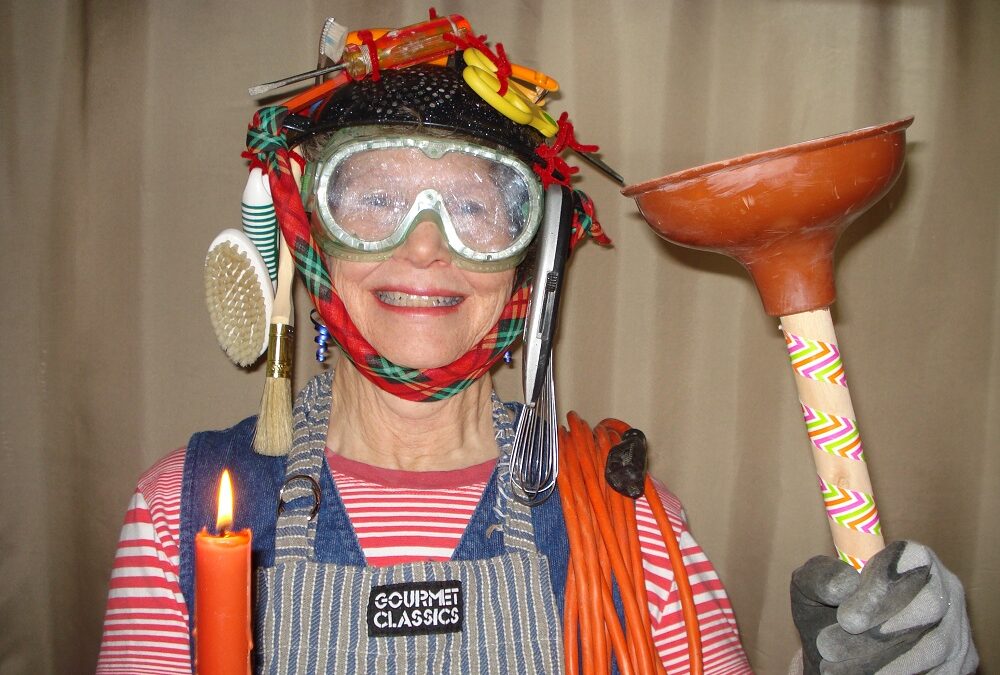
by wp-admin | Dec 9, 2021 | Exploring the Mental Fitness Formula
All it takes is a point of light, a ray of hope in the darkest night… Randy Travis
Do you ever have moments when you get what seems like a great idea, but later you reconsider and decide you’d be crazy to try to do that? Here I am to show you what crazy looks like! I put this costume together when my son was six and we were going to a Halloween costume party. I sewed him the clown costume he wanted and designed my Mrs. Fixit trappings to express the longing I had to find full-time work as a therapist. Here’s how Mrs. Fixit lights her candle and keeps it burning.
In 1976 had my Ph.D., but lacked the confidence to pursue a therapist job during the mental health climate of the time. So I did part-time jobs that grew me in new ways. The most powerful was two years of marketing the Dale Carnegie Course. I was never very good at it, but I got over my HSP self-consciousness. Every day I’d cold-call on companies in the northwest Chicago area until about 3:00 pm, when the pain in my gut from fear made me go home to lie on the couch and regroup. Gradually, I realized that I shouldn’t take other people’s reactions to me personally and my gut became more comfortable for life. My favorite saying that our boss, Jim Bowen, gave us for this fear was “Nobody ever kicks a dead dog.” This helped me learn how to keep my candle burning indefinitely.
How do you decide when a “great” idea is great enough to pursue? Research to discover what else has been done in the field. Has your idea already been done; what came of it? Why? Maybe it wasn’t very well done, or you could do it in a different way to good effect. Or you might choose a different great idea to pursue. Get the training necessary for developing your idea. Finally, as Napoleon Hill advised in his book, The Master-Key to Riches, find a like-minded group to support you along the way.
If you’re confused about which direction you should take, because you have ideas in several areas, check out Pt. II Chapter 7 of my book, where there’s an exercise to help you set short- and long-term goals in key areas. Review your life to consider what you’ve loved doing and where you excel, then talk with trusted friends and mentors about what they think might be most fruitful for your to explore. Try some smaller, related projects to see how they work for you. You’ll likely discover personal limitations that prevent you from pursuing some ideas. Your Wise Parent should be assuring your Child that you have all the talents you need to live a rich and meaningful life. If it’s not doing that well enough, it’s time to review Part I of Claim Your Own Mental Fitness to learn how your Adult can transform some unexamined Toxic Beliefs (especially toxic Belief #2) into Wise-Parent guidance.
Elaine Aron (hsperson.com) has developed a video, Sensitive, about HSPs (Highly Sensitive Persons or those with sensory processing sensitivity) to help them find the confidence and acceptance they need to bring their talents into a world that tends to overwhelm them and snuff out their candles. As an HSP I’m grateful for her work, but I know that many non-HSP’s also get discouraged. Too many distractions of daily living pull us away from our goals. There are too many people with unresolved grief and anger who want to crush anyone who expresses enthusiasm and confidence. I guess it makes them feel better about their own dead candles, but all they’d have to do to reignite them is build up their own Wise Parents.
Remember it’s good to be a living dog and embrace life with energy and a sense of purpose. Celebrate where you are on your journey with a costume, picture or symbol that expresses where you are and keep your candle burning.
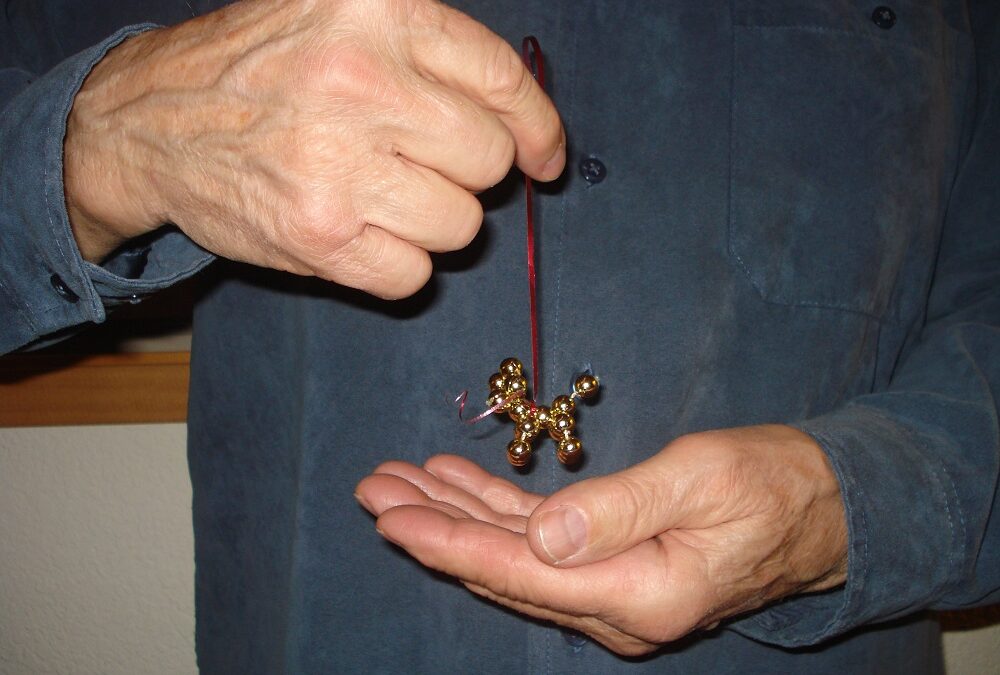
by wp-admin | Dec 9, 2021 | Exploring the Mental Fitness Formula
The deepest principle of human nature is the craving to be appreciated. (From the Dale Carnegie Course, 1976)
Here’s a new take on compassion and assertiveness! For a stronger Adult, a wiser Wise Parent and a more secure Child, consider the story of “Compassion, Assertiveness and the Pop-Bead Puppy.”
As I sat feeling exhausted in my doctor’s sunny waiting room, an older man holding a string of gold-colored pop-beads came over to me. He said “I want to give you something.” I was touched by his kind, gentle manner and invited him to sit next to me. Before retiring he’d traveled all around Louisiana working for Carpenter Tractors. Gradually he’d discovered that what he loved best to do was “put a smile on a someone’s face.” He said giving tiny pop-bead animals to people was his way to do that and he twisted the golden beads into a puppy for me.
I asked the Bead Man what he did when people got annoyed and treated him like he was trying to do something harmful to them. His face darkened and he said, “That’s bad.” After a moment he added, “but I know He (pointing upward as his face brightened) knows what I’m doing. I shared with him how I’d spent my life trying to find ways to do the same thing. I thanked him and as he left we laughed about how we both “just couldn’t get enough of those wonderful smiles.” This left me to ponder the issue of how humans react to what others offer them.
This gentle man felt really bad when people turned their eyes and hearts away from him as though he were panhandling for loose change. He wanted so much for people to give his gift a chance and could only keep going because he believed that a Higher Power recognized and appreciated him every time. Let’s consider what his motives might have been to perform this unusual behavior. Was he really panhandling for something else that would take from others much more than it gave? We’d call that self-serving and turn away. We could stay open to a friend who did that for a while, but not a stranger. Perhaps we’d fear that if we “gave him an inch, he’d take a mile,” and try to expand the contact into asking, say for a meal or a donation or more listening than we wanted to offer.
The Bead Man told me he just did this to see me smile. Why would he want to do that? He could be one of Elaine Aron’s HSP’s with “sensory processing sensitivity,” whose mirror neurons in their brain get more excited by smiles than the other 80% of the population, so he’d just be sharing what he loves. Chefs, artists, car dealers and most of the rest of us like to do that with others who enjoy the same things. They learn not to take rejection of their gifts as a rejection of themselves and to accept that what they offer may have limited appeal. Finally, he may have found this as a way to somehow transform grief from his life, like the mothers whose children were killed by drunk drivers joined to form MADD, with profoundly rooted zeal and determination to keep fewer children from dying this way.
When someone offers you a gift with an extra urgency that could make you suspicious and turn away, try staying open and allow your Adult to consider thoughtfully where this earnest person is really coming from. Unless there could actually be life-or-death consequences, let your Wise Parent assure your Child that your assertive Adult can set effective limits as needed. Remember that all of us want recognition and appreciation from each other, whatever our styles and the gifts we offer. You may find a kindred spirit along the way to brighten the path of your journey and soothe the pain we all find as we travel.

by wp-admin | Dec 9, 2021 | Exploring the Mental Fitness Formula
The graph above describes an intuitive view of the grief process, based on how much energy grief seems to require at each stage. The way energy flows in your process may be different, but what’s important is for your Adult to learn how to recognize the five stages as they happen. Grief can prevent mental fitness and the kind of joy that makes life a rich adventure. It sucks out the hope human beings need to keep engaging in life. Seeing grief in five stages allows your Adult to track your progress and observe when you’re moving forward, sliding back or getting stuck. Humans do seem to share this five-stage process while they grieve in their own way.
In this post we’ll look at the first two stages of this process and the next three in the following post. Toxic Beliefs create unrealistic expectations for what life brings you. You have a loss to grieve each time these aren’t met. The beliefs of your Critical Parent may cause you to lose confidence in yourself as well as others. For example, Belief #3 encourages you to set standards for yourself and others that may be unrealistic. Your Indulgent Parent embraces Belief #8, that happiness depends on what happens to you and other beliefs that make you expect more from other people than you’ll receive and less from yourself. Each of these Parents sets you up to expect things that your Adult could recognize are unrealistic.
Denial and bargaining are the first stages of the grief process. They can happen outside of your awareness for just awhile or for years. In many cases Toxic Beliefs that interfere with your Adult functioning were somewhat valid when you were a child. If your parents had outgrown these, they might have offered role models for how to revise them as you grew up. If not, you’ll need to do this on your own, possibly with the support of wise, mature friends or a counselor. Your watchful Adult can learn to recognize their influence and help you face and heal your losses. Your Wise Parent can become your Child’s reliable internal support, replacing your Critical and Indulgent Parents as it comforts you with revised beliefs. This support will allow your Child to tolerate the next stages of your grief process and reduce tendencies to revert back into previously visited stages.
Denial begins when your Child can’t believe or accept that what she counted on doesn’t happen. Perhaps your mother didn’t make you feel loved and Belief #1 that you must have the love of a significant person, haunts you years later with fight-or-flight reactions in close relationships. You need a way to grieve and heal this wound, but your Adult can’t tackle this problem as long as you deny its impact. Perhaps your father’s job helped reinforce his father’s embrace of Belief #3, that his standards must always be met, and he was unfairly critical of you and others. Maybe your grandmother’s Indulgent Parent encouraged you to feel like you deserve to feel sorry for yourself when things don’t go easily for you and you’re upset to be disappointed over and over again (Belief # 11 or # 12). As long as you deny or minimize these very painful facts (with or without awareness), your Adult can’t revise your beliefs, and you don’t build a Wise Parent to comfort you.
Bargaining happens when you use irrational strategies to maintain your denial. Belief # 1 could lead you to minimize what one parent did to hurt you, because you feel like you must have at least one parent who loved you when you were a child. As an adult, this belief might keep you from being assertive with a friend or partner as your Child trembles with the fear of losing him. Belief #3 could make you try to pressure others to behave according to the standards you’ve learned and get very disappointed when they don’t. You might block out or lie about memories from the past if Belief # 5 leads you to fear that your past determines what your present life can be. This internal bargaining might delay loss of a friend or a job, but it may also set you up for more loss when you friend or associate loses respect for you and doesn’t want you around any longer.
You’ll note on the graph that these denial efforts do cost more energy than when you’ve resolved the grief process. If you remain in denial and bargaining, your Child’s sense of security remains lower and your Indulgent and Critical Parents respond with heightened signals for fight-or-flight. When a new loss occurs, your Adult will have less ability to sort out what’s going on as your feelings of fight-or-flight escalate. If your Adult can keep resolving your grief as events happen, you’ll be resilient for future disappointments, frustrations and trauma. This requires you to move out of denial and on to the next stages of grief, anger, sadness and acceptance.
Social anxiety is another common issue for HSPs. It is a chronic form of Personalization that can be isolating and very harmful. It’s the feeling that the people around you are always looking for ways to find fault with you. I remember feeling sick to my stomach as I sat among the 20 kids in my kindergarten class for most of the year. As a young teenager I’d easily be triggered into the same feeling when I had to cope with several kids. This problem was worsened because my family often enjoyed teasing me until I cried and ran away when we sat at the dinner table. They justified this by telling me, “The world’s a harsh place and we’re trying to help you stop being so sensitive.”*
Although most of my HSP clients weren’t tormented, social anxiety was prevalent for them. I was so miserable by age twelve that I began reading to find some answers. I received my first Bible and loved to read about the kindness that Jesus taught people to offer everyone. I read my dad’s copy of How to Win Friends and Influence People and discovered that people need you to focus on them and listen well. I journaled every night, noting whether I had done that. I was a lonely, intense and talkative kid, so this was difficult, but I learned to stop sharing much about myself with anyone but a couple friends and to listen well.
One fascinating thing I discovered during this self-improvement effort was how really focused on themselves most people (including me) are. It was such a relief to realize that I could be invisible to most people simply by not talking. As I shared these strategies with my HSP clients, I received the most surprised reactions when they tried this experiment: When you’re in a group of people you don’t know well, engage another person in light conversation (“small talk”) by asking about them, their family, their hobbies, their job, what they’ve done for fun lately. Encourage them to talk for a while and then add a very brief comment about yourself related to what they’ve been sharing. See how long it is before they look at their watch. My clients usually were skeptical, but would return and exclaim that they couldn’t believe how quickly others actually did that, and then moved on to talk with someone else. We agreed that those who actually kept interacting might be friend material, unless they were leading up to a marketing proposal.
When I worked for the Dale Carnegie classes in Chicago I was taught how to engage a boss to listen and sometimes make the choice to pay for an employee to take the classes that embodied what I’d read in his book when I was twelve. It brought me to tears to see how others were transformed in the fourteen-week, four-hours-a-night class. Gradually, I overcame most of my remaining social anxiety as I grew in my interpersonal skills and discovered that others’ responses really had almost nothing to do with me. I never became a great salesperson, but what I learned has meant so much more than money for the rest of my life.
Another problem HSPs have is that too often when they tell their doctors about their anxiety and how it cripples them, they’re offered addictive medication (like the valium I was prescribed and didn’t take). Usually they aren’t clearly referred for counseling, where they could learn how to cope without this, even when the meds begin to cause serious problems. I’ve worked with HSPs addicted to these medications who went thru hell to get off of them because of their HSP sensitivity to these drugs.
*In Elaine Aron’s video, Sensitive, she describes how often family and friends may try this damaging approach with HSPs and provides a thorough description of what a “Highly Sensitive Person” is. It’s available for about $10.00 at her website, www.hsp.com .
principle of human nature is the craving to be appreciated. (From the Dale Carnegie Course, 1976)
Here’s a new take on compassion and assertiveness! For a stronger Adult, a wiser Wise Parent and a more secure Child, consider the story of “Compassion, Assertiveness and the Pop-Bead Puppy.”
As I sat feeling exhausted in my doctor’s sunny waiting room, an older man holding a string of gold-colored pop-beads came over to me. He said “I want to give you something.” I was touched by his kind, gentle manner and invited him to sit next to me. Before retiring he’d traveled all around Louisiana working for Carpenter Tractors. Gradually he’d discovered that what he loved best to do was “put a smile on a someone’s face.” He said giving tiny pop-bead animals to people was his way to do that and he twisted the golden beads into a puppy for me.
I asked the Bead Man what he did when people got annoyed and treated him like he was trying to do something harmful to them. His face darkened and he said, “That’s bad.” After a moment he added, “but I know He (pointing upward as his face brightened) knows what I’m doing. I shared with him how I’d spent my life trying to find ways to do the same thing. I thanked him and as he left we laughed about how we both “just couldn’t get enough of those wonderful smiles.” This left me to ponder the issue of how humans react to what others offer them.
This gentle man felt really bad when people turned their eyes and hearts away from him as though he were panhandling for loose change. He wanted so much for people to give his gift a chance and could only keep going because he believed that a Higher Power recognized and appreciated him every time. Let’s consider what his motives might have been to perform this unusual behavior. Was he really panhandling for something else that would take from others much more than it gave? We’d call that self-serving and turn away. We could stay open to a friend who did that for a while, but not a stranger. Perhaps we’d fear that if we “gave him an inch, he’d take a mile,” and try to expand the contact into asking, say for a meal or a donation or more listening than we wanted to offer.
The Bead Man told me he just did this to see me smile. Why would he want to do that? He could be one of Elaine Aron’s HSP’s with “sensory processing sensitivity,” whose mirror neurons in their brain get more excited by smiles than the other 80% of the population, so he’d just be sharing what he loves. Chefs, artists, car dealers and most of the rest of us like to do that with others who enjoy the same things. They learn not to take rejection of their gifts as a rejection of themselves and to accept that what they offer may have limited appeal. Finally, he may have found this as a way to somehow transform grief from his life, like the mothers whose children were killed by drunk drivers joined to form MADD, with profoundly rooted zeal and determination to keep fewer children from dying this way.
When someone offers you a gift with an extra urgency that could make you suspicious and turn away, try staying open and allow your Adult to consider thoughtfully where this earnest person is really coming from. Unless there could actually be life-or-death consequences, let your Wise Parent assure your Child that your assertive Adult can set effective limits as needed. Remember that all of us want recognition and appreciation from each other, whatever our styles and the gifts we offer. You may find a kindred spirit along the way to brighten the path of your journey and soothe the pain we all find as we travel.
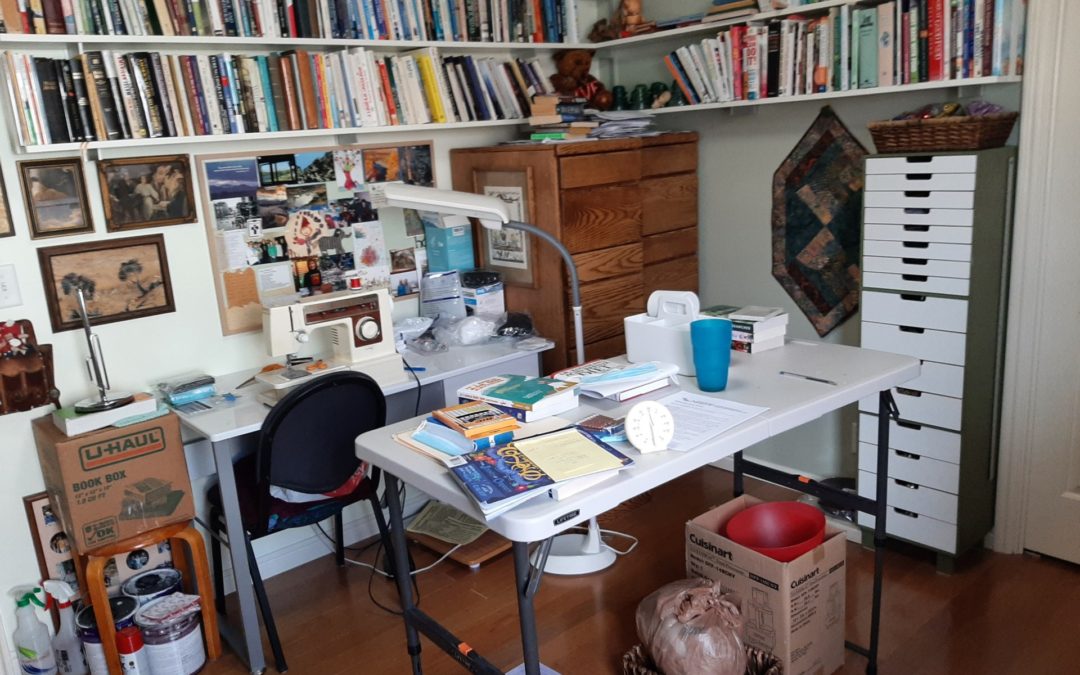
by wp-admin | Dec 9, 2021 | Exploring the Mental Fitness Formula
Why do today what you can put off till tomorrow? A clear desk is the sign of a sick mind. A stitch in time saves nine. Research has shown that order in our surroundings reduces anxiety. You should be more responsible!
Full disclosure, this is a picture of my craft room/office today! The balance between my Critical and Indulgent Parents and my Wise Parent teeters on the edge when I get too involved in a project like completely revising my website. The stack of unfiled papers seems innocent until I can’t find a document I must have. The flurry of sticky notes, small tablets of ideas to consider and unfinished posts requires me to shuffle through them as I work. My hard copy files are mostly in chaos and I have pieces of craft projects stuck all around the room. But I keep focusing on getting this done and then I’ll take some time to put it in order again. Fortunately I can escape to more orderly rooms as needed.
Procrastination offers lots of opportunity for humor and it’s good to laugh at yourself when you notice that you’ve yet again sabotaged the quality of your efforts and your peace of mind. Belief # 9 states that it’s more comfortable to avoid than to face problems or responsibilities. When you realize how Belief #9 ignites fight-or-flight, you won’t be so amused. You’ll notice that the other Indulgent Parent beliefs depend on Belief # 9, and its power to encourage flight from problems you face. Your Adult should look for these other beliefs when your body signals that your Child’s anxiety has increased.
When you think of procrastination, you probably consider a project you resist doing or the time-crunch created because you put something off too long. But this toxic avoidance occurs far more widely than that. It happens whenever your Adult fails to manage your Child’s impulses to seek comfort right now. Without your Adult’s attention you may replace problem-solving behavior with activities that please your Child so much that you actually forget the reality you’re avoiding. These activities can become addictions which disable your Adult and allow neglect of your problems and responsibilities, sometimes for years. Claim Your Own Mental Fitness, Part II, Chapter 2 in my book offers insights about several addictions.
Because your fight-or-flight tendencies never disappear, your Adult must not take a vacation from managing them. The first step to prevent damaging avoidance is to recognize the influence of your Indulgent Parent quickly. Your Adult can observe that flight dominates when you first choose to avoid things; but then fight can take over if anyone tries to push your Child into facing your issues. Your Adult can’t take much time off, just like the baby-sitter for a three-year-old. People vary in how quickly their Child will get hooked on avoidant or just fun activities. But no one can trust a Child to cope with life on its own.
You can’t allow too much humor about this; keeping your Adult in charge is the key to mental fitness and the self-respect, self-confidence and relationship-satisfaction that it brings. In fact, your Wise Parent must reinforce Adult efforts to prevent your Child from luring you into too much indulgent behavior. Look up “procrastination” online to discover many wise people’s statements to build up your Wise Parent.
Gradually, your Wise Parent’s self-talk will overcome your Indulgent Parent’s influence and support your Adult as it reminds you that almost no problems are unbearable or life-threatening. They’re just boring, frustrating, annoying, embarrassing, unfair, inconvenient or temporarily overwhelming. No need for fight-or-flight, we’ve got this. It’s not more comfortable in the long run to avoid unpleasant realities. We’ve noted how Belief # 9 impedes the grief process when denial and anger prevent you from facing your sadness. It’s only a temporary solution promoted by your Indulgent Parent. Using the FORMULA, your Adult and Wise Parent together can gradually reassure your Child to the point that your Adult won’t have to work so hard to stay on task.

by wp-admin | Dec 8, 2021 | Exploring the Mental Fitness Formula


In my practice I saw many people struggle to manage fight-or-flight reactions in their work relationships. In these settings, since there were both friend- and livelihood-related issues at stake, their reactions were often intense and long-lasting. Sometimes they would get physically sick and often they felt trapped. They needed a bridge to take them over their grief either to adjust to their situation or cross over to another healthier one.
It was helpful for them to learn about the grief process in these situations and lower their stress levels. First we’d look at the first two stages, denial and bargaining, which usually occur without your awareness. At work when you encounter a person whose behavior hurts or frustrates you, you often can’t just walk away. First you assume that he actually could understand what you’re experiencing and help with the situation. When these efforts fail, instead of grasping that he, for some reason, can’t understand, you may deny this possibility. You struggle to reach him too long (bargaining) because you just don’t want to accept that this is true, especially when you must deal with him often. Then your supervisor might also use denial (knowing it or not) and insist that you cope anyway. Sound familiar?
You can maintain denial indefinitely as you suffer anxiety or frustration in these situations. Your Adult can reduce this tendency if it expects your flight into denial. As the graph above Post #24 suggests, denial doesn’t prevent stress, even though it temporarily suppresses intense fear, anger or sadness. When a manager in a work setting won’t engage his Adult to face that he has an employee whose dysfunction is serious, he diminishes the energy of his whole team. It’s hard to manage his own fight-or-flight reactions at the same time that he tries to interpret what’s going on with others. Effective managers can do this. Other managers often don’t know how to manage their own reactions and may also lack the Adult support from their own managers to take appropriate action. “Don’t make waves,” if you want to be promoted, is a formula for institutionalized denial.
After a while, it’s perfectly understandable that the third step in the grief process, anger, would emerge. First you get angry at the frustrating person for failing to understand, no matter what you try. You might even believe that he does understand, but is deliberately antagonizing you. Then you get angry at those who refuse to face the reality of his deficient functioning. You might even get angry with yourself because you can’t resolve what you’re expected to manage on your own. As I noted in Post #23, it’s possible to get stuck indefinitely in the angry stage of the grief process. This is especially damaging, because anger takes so much of your energy and harms your body with toxic surges of fight-or-flight chemicals. It can also lead to more stress and loss if you displace it into other relationships.
Therefore, I recommend that your Adult and Wise Parent help you move on to the fourth stage of the grief process which is sadness. It’s sad that this other person can’t walk in your shoes or find ways to cooperate with you. It’s sad that he may lack the brain functioning (because of his wiring and/or his experience) to use his Adult when he interacts with you. It’s sad that many supervisors don’t use their Adult capacity to manage properly. Sadness is less damaging than anger because it takes your mind and body closer to acceptance of the reality you face. You recognize it’s not within your power to change the situation and you may release your frustration through healing tears.
I haven’t seen people stay for long in pure sadness. They return to angry bargaining or move ahead to the fifth stage of grief, acceptance or adjustment. If you keep going back to “bang your head against a stone wall,” you’re likely to develop depression. With depression you fluctuate between anger and helpless sadness until you exhaust yourself. This can happen without your full awareness unless you keep your Adult alert to where you are in the grief process.
If you have a very toxic work situation it’s usually best for you to move on to another job, after you’ve tried for a reasonable time to cope. If you’re confused or overwhelmed, be sure to find a counselor or wise friend to help your Adult sort this out. Once you accept the sad reality of these non-mentally-fit associates, you can leave strategically, with dignity and less discomfort for yourself and your loved ones. It’s helpful to stop bargaining and getting angry with them. I told my clients how often I’d seen a simple change in work environment end the symptoms that had put them on medication, ruined their relationships or damaged their physical health. The Wise Parent phrase, if I don’t have the power to change a situation, I can’t have the responsibility is good to keep close at hand.

by wp-admin | Dec 8, 2021 | Exploring the Mental Fitness Formula
The previous post described how a worker might assume that a co-worker would see a situation the way he did and might have also believed that his managers would agree with and support him. When these expectations weren’t met he might enter the grief process. We call it empathy when people do understand each other’s point of view and feelings. But it’s a mistake to assume that we or others can do this accurately. It’s important for your Adult/Wise Parent team to know that your human nature is biased against differences. Then you can expect that it will take time and effort to get to know another person, before you assume anything about him. This will prevent a lot of disappointment and grief.
When your Adult can recognize your own biases against others who are different, it has a head start in your relationships. This knowledge alone can help reduce the power of your Toxic Beliefs. You’ve probably seen dogs or cats in fight-or-flight when they encounter an animal they consider different. When humans were evolving, it’s likely that offspring who couldn’t keep up were rarely protected at the expense of the tribe. Different tribes might have often been hostile and dangerous. Perhaps some of these might have been a human sub-species or otherwise look different in ways that were considered threatening. Because of how widespread human antagonism is toward those who seem different, it’s likely it had survival value sometime in our past.
Today we still see in our newspapers that fight-or-flight on a large scale happens between groups with differing religious beliefs, races, ancestors or tribes, customs, accents, gender identities, social status or amounts of wealth. I’ve described how people with different brain wiring must struggle to make their way in the larger society. Fitting in is close to a matter of life or death, to get a job, have a family or relax in your neighborhood. Young gay people and soldiers changed by war trauma often kill themselves because they can’t find a way to join in to our society. Poverty causes other divisions. Some turn their backs on those less fortunate as they struggle to climb the ladder of success, with varying degrees of compassion or guilt. The poor may develop a culture of distrust after too many set-backs overwhelm them.
It can give you peace to have your Adult remain aware of this bias as you cope with others. Anxiety about whether someone accepts or rejects you comes from your Parent’s warning that it’s dangerous not to have their approval. If you’re different from another person in ways they can notice right away, their human bias will probably push them to keep their distance. In that case, your Adult can keep your Parent and Child out of fight-or-flight by reminding them that Belief #1, that you must have the approval of any particular person, is false. When your Adult can keep you open to accepting what the other person offers, it will be more possible for time together and gradual comfort with your differences.
It’s sobering and calming to recognize your own tendency to over-react to others’ differences. You’ll be less likely to embrace Belief #3, that you or others should meet some set of expectations or suffer blame and punishment. Your Adult can’t be alert enough for you to escape entirely this human bias against people who are different. You may be fine with racial differences, but not religious. You may be repulsed by a homeless person or offended when a person expresses a cultural difference. You may be tempted to condemn those who haven’t provided as well for themselves as you have, and shun them to enjoy the company of wealthier people in your gated community.
This bias against those who are in some way different from us is a reality of your human nature that you must avoid denying. You need to grieve it all the way through, and accept it that it exists for both yourself and others. Then you’ll be happiest when you can transform this disturbing trait into a life-long challenge to overcome its influence. Polarized attitudes can lose some of their heat when you can have compassion instead of angry judgment for people who express this bias without realizing it. It’s a benefit of mental fitness to be able to help others discover this about themselves and re-set their relationships. You may have a future in the United Nations!
It’s time for humans to recognize this along with the other ancient wiring of our human nature. We need to live into our present, more evolved potential to solve human problems without automatic leaps into fight-or-flight over the differences between us.

by wp-admin | Jan 3, 2016 | Exploring the Mental Fitness Formula


In post 16, “Brain Differences and Fight-or-Flight,” I discussed how some people, whose wiring is significantly different from average, struggle harder to keep their Adult in charge. Now I’d like to describe how we, who are troubled by our differences, must resolve our grief over them to stabilize our Adult long-term. We must fortify our Wise Parent to be even stronger than average to avoid damaging shame, anger, anxiety and depression. We need to find within and outside ourselves sheltering branches, like those in the rock family picture, to comfort us as we try to cope. I’ll use my journey with this as a Highly Sensitive Person (HSP) to illustrate.
I knew I had to work harder by age ten because of my social anxiety and awkwardness. I also disliked how I could get easily annoyed by small things and very upset over any teasing. By age twelve I was studying Benjamin Franklin’s diary, where he tracked about a dozen behaviors for self-improvement. He noted that, as his score improved in the other areas, his humility score decreased. After reading Dale Carnegie’s How to win Friends and Influence People, I kept notes daily on how well I listened to others and refrained from sharing much about myself. I remained very closed off, except with one or two friends, until I went to college. I’ve seen many HSP clients who never tried again to engage with groups socially after junior high. (See hsperson.com with Elaine Aron.)
Until my first marriage failed at age 27, I didn’t have much non-work social contact due to my need to study hard in college and work many hours a day after that. At that point I received an assistantship for my Ph.D. program in Counseling Psychology. Over-reacting to my divorce, I was wracked with relentless insomnia and panic attacks. I grabbed every idea from my course work that I could about how to heal myself, for my own survival and so I could be a good mother to my two-year-old son. I didn’t accept the valium I was offered. The horrible panic attacks proved a gift for my healing and my ability to help others. I practiced the cognitive therapy and intense self-observation I learned in my classes day and night. I discovered exactly what self-talk and circumstances would set off or shut down a panic attack, and got over them in five years. The insomnia persists whenever I take on too much in my life or let even a minor social interaction disturb me. I still resent that.
I discovered that saying punishing things to myself out of frustration with my HSP wiring (now identified as sensory processing sensitivity) only provoked more anger, anxiety and panic. I learned to be gentle with my Child just to stay out of fight-or-flight. I realized this positive approach, and not the negative confrontations popular then, would also be most helpful to clients. I had to revise especially my Critical Parent’s toxic beliefs to sustain this approach and build a strong Wise Parent. To do this on a stable basis, I had to complete my grief process over the HSP brain I was dealt, long before the HSP trait was identified. I knew I wasn’t just suffering from the divorce trauma; I’d always been too anxious and hyper-sensitive. Denial, anger, and sadness over how I was different all had to be fully processed for me to reach self-acceptance.
Of course, many others have brain differences which cause them much more pain and limit them worse than being an HSP. But somehow they must also find a way to accept themselves in order to enjoy the gifts they do have, especially when others judge and blame them. Temple Grandin has done a heroic job of this with autism, but we can’t all manage that. If we just grow our Wise Parent’s sheltering branch inside and find the environment that supports us, we can each thrive in our own way. Compared to those with schizophrenia, severe bipolar disorder or other major impairments to their Adult functioning, my struggles are nothing.
It’s crucial that individuals and society stop indulging their biases against people who are mentally different in crippling ways. Worldwide mental health services are poorly funded and inadequate. It’s not true that everyone is born and raised to be equally capable of managing life. It’s the worst expression of our primitive human nature to shun them and leave them to suffer. We don’t have to do that to survive like our distant ancestors may have. These people deserve the deepest compassion and steadiest, wisest support from us fellow humans to help them be kind to themselves while they search for ways to join in.
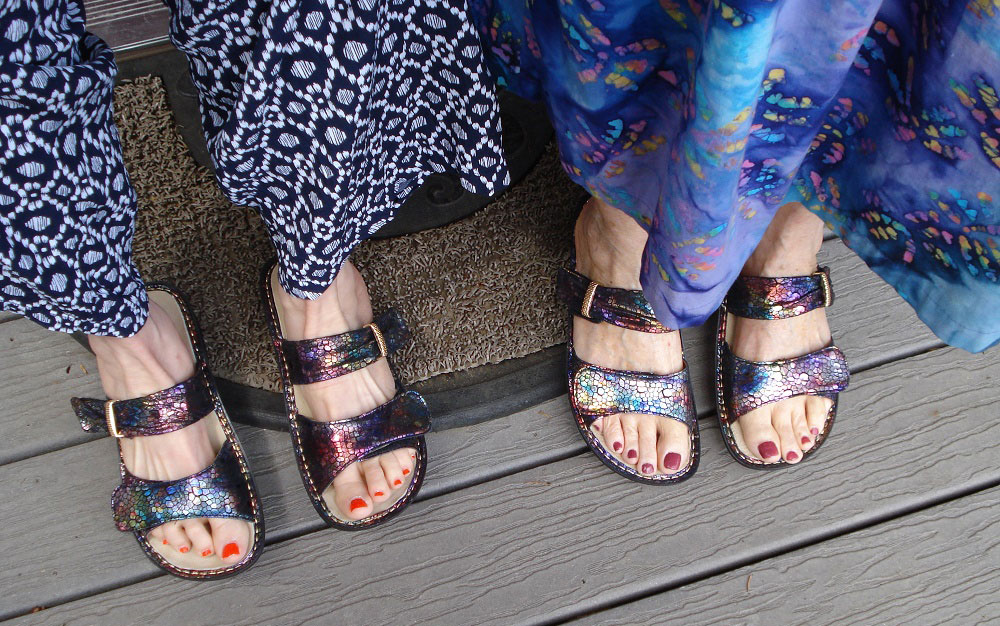
by Rea | Jan 1, 2016 | Exploring the Mental Fitness Formula
I just know where she’s coming from…
Here’s another example of how being wired differently from others can affect you journey toward mental fitness. Elaine Aron observed that HSPs tend to “take things way too personally.” After working with hundreds of HSP clients (and myself) I can certainly vouch for what she says. Personalizing plagues most HSPs, requiring us to work hard not to jump into fight-or-flight so easily when we interact with others. We may assume that we can quickly and easily walk in another person’s sandals.
Since, according to Aron, about 20% of people have this trait, many of you who are following my blog will benefit from her video, Sensitivity. Aron describes some of the positive aspects of the HSP trait in her discussion, along with the problems we have and emphasizes that the world needs HSP’s compassion and concern for justice. She hopes that her video, Sensitive, will help HSPs overcome enough of our natural anxiety to allow us to endure social stress and contribute what we do have to offer. She hopes this video will help you eighty percenters to understand and support us as we work at this.
As with others whose brains are noticeably atypical, HSPs have to work harder throughout their lives to function well, especially socially. Attention to detail (even perfectionism) and being conscientious are HSP assets as well as liabilities, when our overactive Critical Parents step in with Beliefs #1 and #3. My HSP clients were usually very diligent about learning and using the FORMULA, which helped them engage better socially. I’ve found it helps HSPs to accept that others who seem less conscientious aren’t driven to perform well by anxiety like HSPs are wired to be. They usually aren’t slacking off to take advantage of an HSP or to frustrate her, as personalizing would have some HSPs believe.
You 80% who aren’t HSPs can relate to personalizing, since it’s probably wired into all of us. You may not be able to understand why HSPs get more intense about it and can’t let go of our Toxic Beliefs as easily as many of you can. Imagine how this excess reactivity could make common interactions worse for HSPs. One case might be where the other person’s intent is unclear. For example, your neighbor asks you once again to water her plants, but doesn’t offer to water yours. You take offense, “what am I, chopped liver?” If you assume he’s using you and get hurt or angry, you may be personalizing. You should then revise Belief #1, that you must have another person’s approval or respect, to calm yourself.
Then as soon as possible, it’s best to visit with her, and try to listen well, to learn how things are going with her. After that your Adult can decide whether just to ask for her to water your plants too,or find someone else, rather than letting your Critical Parent blame her(toxic belief #3) for not thinking about you enough. For an HSP, calming the quick fight-or-flight response to feeling disrespected or rejected, and avoiding an instant trip into blaming the other person can be harder.
Since going over to talk about it is fraught with anxiety, most HSPs will have more resistance to doing it. If An HSP does go over, he’ll struggle to set aside his hurt and anger and have trouble remaining open and positive with his neighbor. Later, whether he talks with her or not, an HSP is likely to review the situation many times before he can calm his fight-or-flight reactions. When the HSP doesn’t resolve it with his neighbor, he’s likely to carry anxiety and distrust toward her for a long time.
Another example is when someone is clearly rude, insulting and hostile toward you. Your Child might ask, “why shouldn’t I take that personally, she’s clearly going after me?” Before your Adult agrees to fight-or-flight, there’s a lot to consider. Does this person even know you very well? What possible brain issues does she have that have nothing to do with you (fatigue, being over-whelmed, weak capacity for empathy, alcohol, toxic beliefs)? How much energy do you want to spend in response, and would it make any difference? Once you ask these, your Adult will have the information for a good choice.
For an HSP this process will often be interrupted by an intense and body-involving sense of hurt, anger or fear in response to the person’s rude treatment, which he may assume has been intended to hurt him. His Wise Parent-Adult team needs to suggest why the rude person’s behavior that was directed at him may not have been primarily in response to him. But his Adult may have to work so hard to reduce his fight-or-flight reactions that it never has the chance to prevent him from full-blown embrace of Belief #3.
If you’re not an HSP or you’re an HSP who’s practiced coping better in these situations, chances are, you’ll decide simply to distance yourself without drawing more anger from your attacker, perhaps by saying “I’m sorry you’re so upset” or making an excuse to leave. This choice allows you to avoid fight-or-flight and the body trauma it creates. If you feel you must “set her straight,” your confused Parent-Child combo is probably overwhelming your Adult by personalizing. This choice would be like cutting back in on a driver who cut in front of you, with potentially traumatizing consequences. The Wise Parent phrase somebody has a problem here, but it’s not me could help your Adult stay in charge as it works on practicing the FORMULA to keep you calm.
Future posts will address how trauma contributes to making instant and intense fight-or-flight happen more often for both HSPs and non-HSPs. Research (see Elaine Aron’s hsperson.com website) has shown that HSPs are generally more vulnerable to childhood abuse and war trauma than non-HSPs. Those who have other brain challenges often struggle to keep their Adults in charge as well. If you have any of these it helps to discover just how they may interfere as you pursue mental fitness. Often you can learn work-arounds and help those who value you to relate with more understanding. Claim Your Own Mental Fitness, Part Two, Chapter One offers brief discussion of many of these with references to additional information about them.























